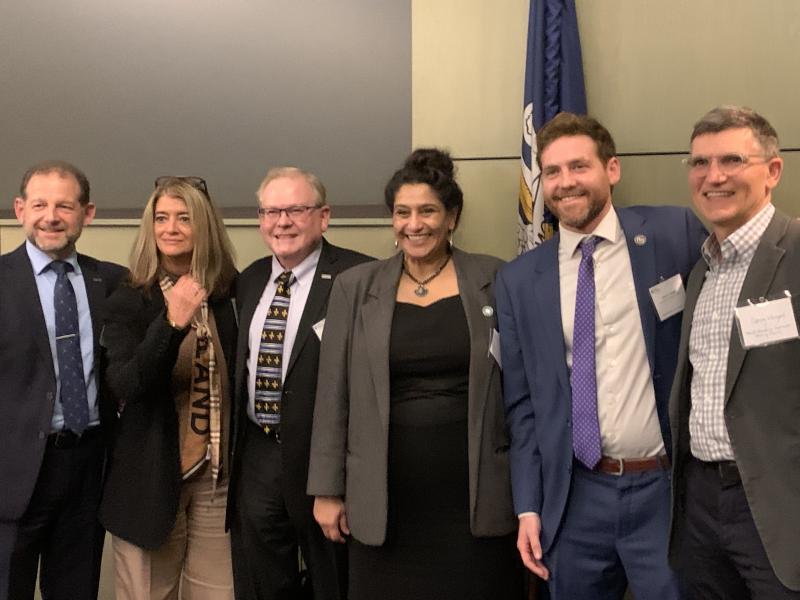Gov. Edwards: Louisiana is ‘poised for success’ with offshore wind energy
Louisiana Gov. John Bel Edwards called offshore wind energy a natural opportunity for renewing Louisiana’s leadership in the energy sector, creating new jobs and helping ease impacts of climate change during the Tulane Law inaugural offshore wind conference held Wednesday, Jan. 18.
Edwards said he was pleased to see the standing-room-only crowd of industry leaders, scholars and changemakers at the event, which packed the Port of New Orleans administration conference room, a herald to the interest there is in a state that is beginning to tap into the potential of wind energy in the region.
“Here in Louisiana, we are uniquely poised for success,” Edwards told the almost 200 participants of the conference. “Offshore wind provides the opportunity for us to build off our existing skill set and experiences in the offshore oil and gas industry.”
The conference, hosted by the Tulane Energy Law Center, along with sponsor Bracewell, was titled “Tulane Offshore Wind Conference: Overcoming Barriers in the Gulf” and highlighted the significant potential in the Gulf of Mexico for wind energy.
The Gulf has the potential to generate almost 510,000 megawatts of offshore wind energy per year. That is twice the current energy need of all five Gulf states, and larger than the potential offshore wind capacity of the Pacific Coast and the Great Lakes combined.
Gulf wind leases are expected to launch in 2025, putting Louisiana and Tulane Law school at the cross-roads of a growing energy sector. The conference is another sign of Tulane Law's growing expertise in wind law, which made it the perfect venue for a conference of regional, national and international leaders in the field, said Dr. Kristoffer Svendsen a Senior Research Fellow at Tulane and the event organizer.
The day-long conference also explored the legal issues surrounding the leasing process, as well as compliance, financing and permitting, among other topics. Speakers included global experts on wind energy, including:
- Matthew Brotmann, General Counsel, Equinor Wind U.S.;
- Kevin Ewing, Partner, Bracewell;
- Charlie Papavizas, Partner, Winston & Strawn;
- Henry Scott, Partner, Milbank;
- Passchier Veefkind, Senior Vice President, Energy/Offshore Wind, DNB.
“This conference is an important piece for Louisiana to place itself as the offshore wind energy hub in the Gulf connecting legal professionals, the offshore wind industry, local and city authorities, and other actors in the offshore wind space,” Svendsen said.
“The U.S. Bureau of Ocean Energy Management (BOEM), the federal agency that oversees offshore oil, gas, and wind permitting, initiated a process that will open the Gulf to wind lease sales hopefully by June 2023, identifying an initial two zones for offshore wind power development, a promising opportunity for significant economic growth locally.”
Even though the Gulf has weaker wind speeds compared to other wind energy areas nationally, the Gulf makes up for its relatively weak winds with other attributes. Its shallow waters reduce the need for tall, expensive turbines, and its warm temperatures and smaller wave heights will make construction and maintenance relatively easy and inexpensive. Port terminals and wharves are already located near the strong offshore wind resources, and offshore oil platforms may gain a second life as wind energy substations or serve in other support roles.
“What truly sets the Gulf apart is its primed and ready workforce,” said Svendsen. “Many of the skills needed in the offshore oil and gas industry are directly transferable to building and servicing wind farms.”
Offshore wind leasing in the Gulf will test whether the Gulf region’s superior oil and gas supply chain, technical know-how, and skilled offshore workforce can accelerate the development of offshore wind beyond that of the Atlantic and Pacific coasts.
With the recent passage of the Inflation Reduction Act (IRA), the Gulf region is ripe for an offshore wind boom, said Svendsen. The IRA now requires oil and gas lease sales of 60 million acres in the previous year as a pre-requisite for offshore wind lease sales.
The IRA also significantly supports offshore wind through the continuance of the Production Tax Credits, a renewed Investment Tax Credit, and new tax credits for offshore wind vessels.
Svendsen said Louisiana companies rooted in the oil and gas industry helped build the U.S.’s first offshore wind farm, a five-turbine pilot project that began operating off the coast of Rhode Island in 2016. The Block Island Wind Farm enlisted steel fabricators in Houma, ship operators from Galliano and engineers from Mandeville.
The opportunity for the regional economy is clear, he said.
"The NREL estimated back in 2020 that the construction of a single 600-megawatt wind farm in the Gulf could support about 4,470 jobs while creating $445 million in GDP,” said Svendsen. “The current wind energy areas off the coast of Texas and Louisiana have the potential of more than 10 times that. That is a lot of jobs and a lot of money.”
Other speakers at the conference included the following:
Karis Anne Gong Parnham, Assistant General Counsel, Entergy;
Andrew Tuozzolo, Chief of Staff, New Orleans Councilmember At-Large Helena Moreno;
Jane Rueger, Partner at Perkins Coie LLP’
Joan Bondareff, Of Counsel Blank Rome and Adjunct Professor, Georgetown Law;
William Baldwin, Partner, Jones Walker LLP;
Benjamin Schupp, Member, McGlincheyl
Emily Huggins Jones, Partner, Locke Lord LLP;
Jonah Wagner, Senior Adviser, DOE Loans Programs Office;
Manisha Patel, Deputy Executive Director, Federal Permitting Improvement Steering Council;
J. Blake Canfield, Executive Counsel, Louisiana Department of Natural Resources;
Mike Celata, Regional Director, BOEM Gulf of Mexico Region;
Monika Gerhart, Director of Intergovernmental Relations for State & Federal Affairs City of New Orleans;
Shafin Khan, Vice President of External Affairs and Innovation UNO Research & Technology Foundation, Inc, Louisiana Wind Energy Hub;
Hiram Mechling III, P.E., PMP Vice President of Offshore Wind Bureau Veritas North America;
Harry Vorhoff, Deputy Director Louisiana Governor's Office of Coastal Activities.

